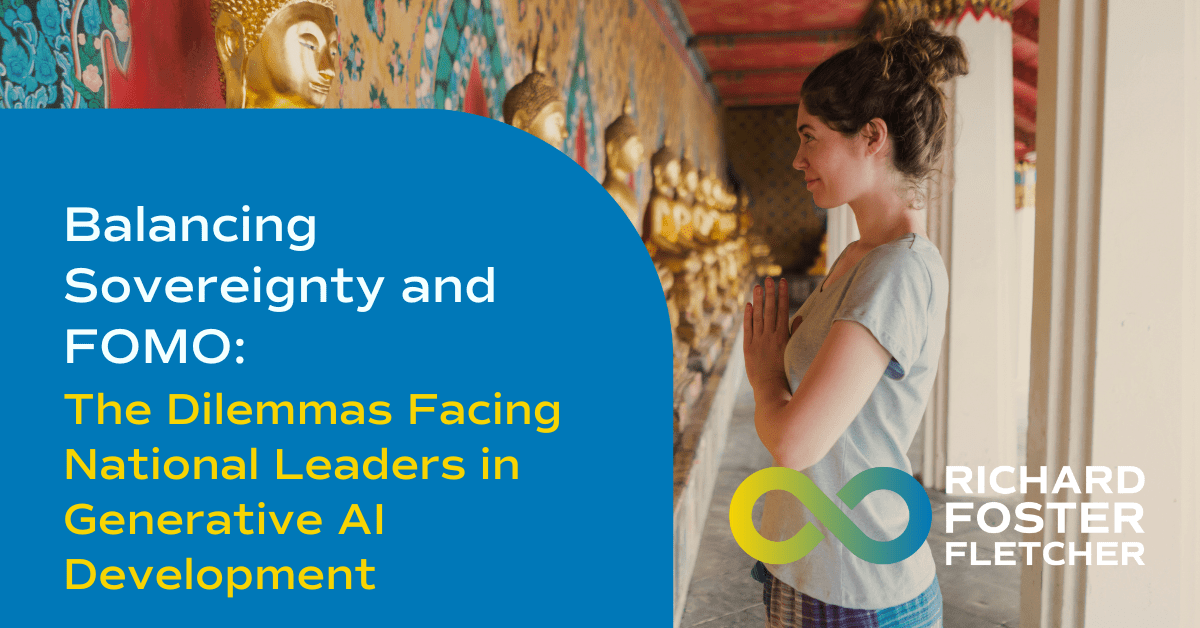
Balancing Sovereignty and FOMO: The Dilemmas Facing National Leaders in Generative AI Development

The race to develop large language models (LLMs) at a country level is not merely a technological endeavour but a strategic necessity for nations. The pressure to create indigenous AI capabilities stems from concerns over cultural misalignment, data sovereignty, and geopolitical influence. Developing a local LLM would allow countries to tailor AI technologies to their unique linguistic and ethical contexts, providing control over how these models reflect national values and handle sensitive data. This approach ensures that AI technologies align with the cultural and ethical standards of the country, fostering trust and acceptance among citizens.
However, the challenges associated with building these models from scratch are significant. Developing an LLM requires vast financial resources, advanced computational infrastructure, and a deep pool of technical expertise. These elements are often concentrated in a few global tech hubs, making it difficult for countries outside these hubs to independently develop competitive AI technologies. Even well-resourced nations face the risk that by the time their models are fully developed, the technology could have already advanced, leaving them perpetually behind. Additionally, the sheer volume of data needed to train these models presents another layer of complexity, particularly when considering the ethical and legal implications of data collection and use.
Despite these challenges, building a local LLM might still be the best option for some countries, particularly those with strong technological foundations and the strategic imperative to maintain control over critical digital infrastructure. Countries that successfully develop their own LLMs can ensure that their models are optimised for their specific needs, leading to better performance in areas such as language processing, cultural relevance, and adherence to local regulations. Moreover, owning the entire AI pipeline from development to deployment allows countries to safeguard their data sovereignty and reduce dependency on foreign technology providers, which is crucial in a world where data is increasingly seen as a strategic asset.
For countries where building a proprietary LLM is not feasible, forming partnerships with established AI companies like OpenAI, Google, and Microsoft is a pragmatic solution. These collaborations enable countries to leverage the technological advancements of global leaders while customising AI models to meet local requirements. This approach allows nations to quickly integrate advanced AI technologies into their public and private sectors without the massive upfront costs associated with developing their own models. For instance, France’s partnership with Microsoft and OpenAI allows the country to use advanced AI tools while ensuring compliance with European data protection laws, an essential consideration under the GDPR.
There have been several instances where countries or regions have partnered with established AI companies to develop localized versions of large language models (LLMs). These partnerships allow countries to leverage existing expertise while tailoring the technology to better suit local languages, cultural nuances, and regulatory environments. Here are a few examples:
- France and OpenAI
- Partnership with Microsoft and OpenAI: France has been exploring partnerships with Microsoft, which is closely aligned with OpenAI, to leverage AI technologies for French public services. The idea is to customize AI solutions, including language models, to better serve the French-speaking population while adhering to France’s stringent data protection laws. This collaboration aims to balance the technological advantages of AI with local regulatory and cultural requirements.
- Goal: The goal is to create AI applications that are fully compliant with the GDPR and reflect French cultural and linguistic characteristics, ensuring that AI services are accessible and relevant to the local population.
- Africa and AI Development (Example: AI4D)
- AI for Development (AI4D) Initiative: While not directly a partnership with existing LLM platforms like OpenAI or Google, the AI4D initiative is a collaborative effort between several African governments, universities, and international organizations, including Google’s AI research arm. The initiative focuses on developing AI technologies that cater to the diverse languages and cultural contexts of the African continent.
- Goal: By partnering with established AI companies, African countries aim to build AI systems that can support local languages, which are often underrepresented in global AI models. This collaboration seeks to enhance the relevance and accessibility of AI tools across Africa.
- Japan and OpenAI
- Japanese Government Collaboration with OpenAI: Japan has engaged in discussions with OpenAI to explore how AI technologies, including LLMs, can be customized for Japanese language and culture. Given the unique linguistic and societal context in Japan, this partnership aims to develop AI solutions that are better suited to Japanese users.
- Goal: The focus is on adapting AI models to handle the complexities of the Japanese language and to align with Japan’s specific cultural and business practices, thus making AI tools more useful and effective for the Japanese market.
- European Union and Various AI Companies
- European AI Alliances: The European Union has been actively fostering partnerships between European countries and AI companies, including collaborations with American tech giants like Google and Microsoft. These partnerships are often geared towards developing AI technologies that comply with the EU’s strict privacy and data protection regulations while also incorporating European languages and cultural values.
- Goal: The EU’s approach is to ensure that AI development within the region reflects European ethical standards, especially regarding privacy, fairness, and transparency, while benefiting from the technological advancements provided by established AI firms.
The advantages of partnering are clear: countries can benefit from state-of-the-art AI models that are already in use globally, significantly reducing the time to market for AI solutions. Additionally, these partnerships allow for the customisation of AI technologies to better reflect local languages, cultures, and regulatory environments. By working with established AI companies, countries can also gain access to the latest research and development, ensuring that their AI capabilities remain at the cutting edge.
However, these partnerships are not without their challenges. Relying on foreign companies for critical AI infrastructure can create dependencies that may undermine a country’s digital sovereignty. There is also the risk that the underlying technology still reflects the values and biases of the companies that developed them, which might not fully align with local cultural or ethical standards. Furthermore, such dependencies could become problematic if geopolitical tensions arise, potentially limiting a nation’s ability to control or access its digital infrastructure.
Several countries have already navigated these complexities by forming strategic partnerships. For example, Japan’s collaboration with OpenAI reflects a strategic decision to enhance its AI capabilities without the extensive investment required to build an LLM from scratch. By leveraging OpenAI’s existing models, Japan can ensure that AI technologies are adapted to its linguistic and cultural context, crucial for their effective deployment in various sectors. Similarly, in Africa, Microsoft’s initiatives aim to empower local entrepreneurs by providing the necessary tools and infrastructure to develop AI solutions that address the continent’s specific challenges.
Despite the benefits of partnering, strong national leadership is still essential. Governments must ensure that these partnerships are structured in a way that maximises the benefits while mitigating the risks. This includes setting clear terms for data use and privacy, ensuring that AI technologies are accessible to all citizens, and fostering the development of local talent and infrastructure. Even when partnering with global tech companies, countries must retain control over critical aspects of their AI strategies to avoid becoming overly dependent on foreign entities.
The strategies for developing, middle, and advanced economies will differ significantly when it comes to AI. Advanced economies, with their robust technological infrastructures and financial resources, might pursue a hybrid approach—building proprietary models in critical areas while partnering in others. Middle-income countries could focus on strategic partnerships that allow them to quickly scale their AI capabilities while gradually building local expertise and infrastructure. Developing economies, on the other hand, might prioritise partnerships that not only provide immediate technological benefits but also include provisions for capacity building and knowledge transfer, ensuring that they are not left behind in the global AI race.
For business leaders, these developments mean that they must stay informed about the evolving AI landscape, particularly in terms of how government policies and partnerships might impact their industries. Companies should be prepared to adapt their strategies to align with national AI policies and consider how they can contribute to or benefit from government-led AI initiatives. Understanding the balance between local relevance and global competitiveness will be crucial for businesses looking to leverage AI for growth and innovation.
Key Questions for Country Leaders
- How can we balance the need for local AI development with the benefits and risks of partnering with established global AI companies?
- What safeguards should be put in place to ensure that AI technologies developed through partnerships respect our cultural, ethical, and regulatory standards?
- How can we foster the development of local talent and infrastructure to reduce dependency on foreign AI technologies in the long term?
These questions highlight the strategic considerations that country leaders must address as they navigate the complex terrain of AI development and partnerships. The decisions made today will have lasting implications for national sovereignty, economic competitiveness, and cultural integrity in the digital age.
















